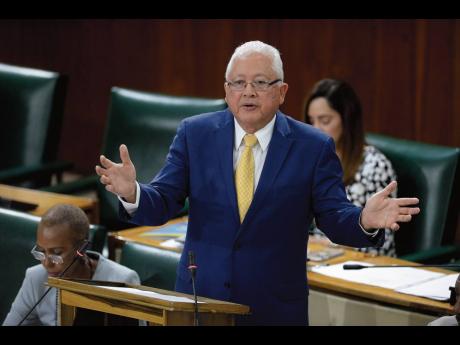Chuck blames banks for fraud racket boom
Minister of Justice Delroy Chuck has called for bankers to provide more foolproof systems to curb the incidence of fraud at financial institutions following suggestions that the justice system is not doing enough to deter white-collar crooks.
It was revealed in last week’s Sunday Gleaner that domestic banks and other financial institutions lost at least $750 million to fraud last year through a network of fraudsters whose elaborate network spans bogus cheques, rental accounts, and card PIN rackets.
“May I say that prevention is much better than cure, and I am not too sure that sentencing and conviction are the real way to stop many of these fraudsters. What is important is for the financial institutions to put in place sufficient protective and preventative measures to ensure that fraudsters do not get through their financial systems,” Chuck told The Sunday Gleaner.
LOW CONVICTION RATE
According to Jamaica Constabulary Force data, there were 3,400 cases of regular and electronic fraud reported to the police from 2013 to 2018. Only 115 persons were found guilty out of 1,029 held for various rackets.
Anti-fraud expert at the Jamaica Bankers’ Association, Lloyd Parchment, has attributed the low conviction rate for fraud locally to the general belief that fraud is a benign white-collar crime.
“The justice system does not recognise fraud as a very important area of criminal activity. They do not treat it seriously. We in the banking sector have continuously been pressing the justice system to recognise fraud for what it is, because we are contending that fraud and the money gained from fraud is fuelling more serious hardened criminal activity that the system isn’t looking into,” he said.
But Chuck contends that judges convict based on evidence provided. The banks are generally required to assist in providing this evidence to the police.
“If the evidence is not persuasive enough, then it is unlikely that one can get a conviction, so oftentimes the real difficulty in getting convictions will be the question of whether or not the evidence provided by the victim, that is usually the banks or the financial institution, whether they have provided strong evidence to convict the offenders,” the justice minister told The Sunday Gleaner.
“If the evidence is not overwhelming or sufficiently strong, you cannot expect the judge to convict or the jury if it is a jury trial, so that what is lacking is the persuasive and strong evidence to bring about the conviction,” he lamented.
Chuck said while he has heard concerns that sentences are not sufficiently harsh and punitive to send the right signal to fraudsters, he does not believe that longer jail time will prove a deterrent. Fraud convicts are generally slapped with sentences of less than five years.
“Long, harsh penalties won’t stop people from taking the risk to breach and defraud financial systems, so it is more important that you prevent, rather than be dependent on the justice system to impose life sentences to stop them,” he said.

